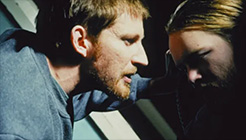|
|
|
|
The Boys
|
 |
|
Rowan Woods’ The Boys takes a grim look at the links between gender, sex and violence in contemporary Australia. The film belongs to an international tradition that runs from John Cassavetes’ Husbands (1970) to Mike Leigh’s Naked (1993) and Gary Oldman’s Nil By Mouth (1997). These boys – hardened by their experiences at school, at work, in prison, and especially within the hell of the nuclear, suburban family – find their only solace in life by banding and bonding together. Their violent, loveless rituals exclude women (even their own girlfriends) and any emotion even remotely feminine or nurturing. Inexorably, these stunted lads move towards committing a terrible act of sexual violence – an act which is not shown in the film, although the entire narrative structure, flashing back and forward, is built around it, like a dark, awful secret. Woods’ film is chillingly stylised. In many respects, it belongs to a grunge or low-life tradition in modern art and fiction, inspired variously by the films of David Lynch, punk music, and the novels of Hubert Selby, Jr (see Uli Edel’s 1989 film of Last Exit to Brooklyn). The Boys (scripted by playwright Stephen Sewell) does not choose to delve into a Marxist analysis of the social conditions causing such massive alienation, malaise and dysfunction. Rather, it simply takes us inside how a person, inhabiting such a hopeless world, must feel. Tristan Milani’s cinematography (replete with work on colour, deframing and blur) and the score by improv combo The Necks are outstanding elements of this impressionistic snap-freeze. The film offers an almost Gothic vision of masculine identity and sexuality turned poisonous (or toxic, to use the fashionable term). There’s a class element to this dark perception which is hard to shrug off: it’s pure Proletarian Hell from start to finish. And Woods, earlier in his career (both as filmmaker and sometime comedic actor), had already served up a somewhat superior, mocking view of working-class manners and mannerisms, particularly in his overwrought short Kenny’s Love (1986), whose dim-bulb hero can’t stop jabbering about “hot doggies at the footy”! As for the women in the story of The Boys, they are (mercifully) not content to remain mere, passive victims of such rampant male oppression: they may collude in the general decrepitude of things, but at least they know instinctively when to resist, shout, fight back or just flee for their lives. Postscript 2024: The Boys went to enjoy an extraordinary afterlife – indeed, it has become one of signal films of Australian cinema, its style emulated (for instance) by Justin Kurzel in Snowtown (2011) and Nitram (2021), and its cultural significance extravagantly flagged in the Adam Cullen art-biopic Acute Misfortune (2018). The Boys unwittingly nailed a certain style-and-subject sensibility that has tenaciously stuck, warts and all, to the Australian Imaginary – especially the imaginaries of those who crave to make ‘edgy’ commercial movies situated somewhere between Art and Genre. Intriguingly, Woods himself as a director did not overly follow the path suggested by that sensibility; he filled a backseat role as assistant/second unit on a key film he influenced, Andrew Dominik’s Chopper (2000); and has since gravitated to high-level but far from auteur-based TV work in series including The Kettering Incident (2016) and Rake (2010-2018). Woods is currently President of the Australian Directors’ Guild. MORE Woods: Little Fish © Adrian Martin August 1998 |
![]()